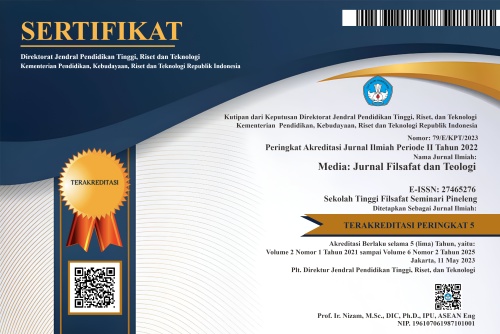Makna Frase ἐν Χριστῷ (dalam Kristus) sebagai Dasar Spiritualitas dan Kepemimpinan Paulus dalam 1 Korintus 4: 6-21
DOI:
https://doi.org/10.53396/media.v6i2.492Keywords:
In Christ; Corinthian Conggregation; Union with Christ; Paul’s SpiritualityAbstract
This study aims to explore the theological meaning of the phrase ἐν Χριστῷ (“in Christ”) in 1 Corinthians 4:6–21 as the foundation of Paul’s spirituality and leadership. Employing a historical-critical approach and lexical analysis, it investigates the intimate relationship between Paul and Christ and its implications for the Corinthian community. The findings reveal that Paul’s spiritual experience in Damascus signified a life transformation and unity with Christ, which shaped his leadership style and teaching pattern. The phrase ἐν Χριστῷ is understood not merely as a theological concept but as a practical principle underlying Paul’s humble, participatory, and unifying leadership. In the context of a divided Corinthian church, leadership “in Christ” emerges as a pastoral model that educates and unites through apostolic example. This study concludes that the spirituality of ἐν Χριστῷ provides the foundation for forming a faith community living in unity with Christ and with one another and offers an ecclesial leadership model grounded in love, humility, and exemplary service.
References
Agteres, Suzan J.M. Sierksma."Imitation in Faith: Enacting Paul’s Ambiguous Pistis Christou Formulations on a Greco-Roman Stage," International Journal of Philosophy and Theology 77, no.3 (1 Juli 2016): 119-153, https://doi.org/10.1080/21692327.2016.1231076.
Baskoro, Paulus Kunto dan Anon Dwi Saputro. "Konsep Biblika Pengharapan Kebahagiaan menurut Filipi 2: 1-4 dan Implementasinya bagi Jemaat Masa Kini di Era Disrupsi," Veritas 12, no.2 (1 Desember 2011): 165-184, doi: 10.46817/huperetes.v4i1.123.
Bastian, Yonas dan Antonius Galih Arga Wiwin Aryanto. "Membangun Komunitas yang Egaliter: Analisis Sosio-Kultural tentang Persoalan Onesimus dalam Filemon 1: 8-22," KURIOS (Jurnal Teologi dan Pendidikan Agama Kristen) 9, no.3 (31 Desember 2023): 730-742, https://doi.org/10.30995/kur.v9i3.386.
Best, Ernest. One Body in Christ. London: S.P.C.K, 1955.
Brookins, Timothy A."Reconsidering the Coherence of 1 Corinthians 1: 10–4: 21," Novum Testamentum 62, no.2 (26 Maret 2020): 139-156.
Byers, Andrew. "The One Body of the Shema in 1 Corinthians: An Ecclesiology of Christological Monotheism," New Testament Studies 62, no. 4 (14 September 2016): 517-532, https://doi.org/10.1017/S0028688516000163.
Campbell, Constantine R. Paul and Union with Christ. Michigan: Zondervan, 2012.
Cockayne, Joshua. "The Imitation Game: Becoming Imitators of Christ," Religious Studies 53, no.1 (1 Maret 2017): 3-24, https://doi.org/10.1017/S0034412516000196.
Duckor, Brent dan Jean-François Racine. "Leading in the Time that Remains: The Passion and Complexity of Paul’s Leadership in 1 Corinthians," Science et Esprit 74, no. 2 (13 Desember 2022): 409-431, https://doi.org/10.7202/1088275ar.
Dunn, James D.G. The Theology of Paul the Apostle. Michigan: William B.Eerdmans Publishing, 2006.
Eastman, Susan G. “Oneself in Another: Participation and the Spirit in Romans 8,” dalam In Christ in Paul, ed. Michael J.Tate. Tübingen: Mohr Siebeck, 2014.
Francis, James M.M. "God's Planting and God's Building: Resolving Discord in 1 Corinthians 3: 5–17," Rural Theology 12, no. 2 (21 April 2015): 72-82, https://doi.org/10.1179/1470499414Z.00000000023.
Friesen, Courtney J.P. "Paulus Tragicus: Staging Apostolic Adversity in First Corinthians," Journal of Biblical Literature 134, no.4 (1 Desember 2015): 813-832, https://doi.org/10.15699/jbl.1344.2015.3088.
Finney, Mark T. Finney. "Honor, Rhetoric, and Factionalism in the Ancient World: 1 Corinthians 1-4 in its Social Context," Biblical Theology Bulletin 40.1 (15 Februari 2010): 27-36, https://doi.org/10.1177/0146107909355087.
Fee, Gordon. The First Epistle to the Corinthians. Michigan: William B. Eerdmans, 1987.
Gorman, Michael J. Participating in Christ. Michigan: Baker Academic, 2019.
Hogan, Laura Reece. I live, No Longer I.Oregon: WIPF & Stock, 2017.
Harris, Murray J. Prepositions and Theology in the Greek New Testament. Michigan: Zondervan, 2012.
Keck, Leander E., dkk (ed.). The New Interpreter’s Bible, vol X. Nashville:Abingdon Press,2000.
Komisi Kitab Suci Kepausan. Penafsiran Alkitab dalam Gereja. Yogyakarta: Kanisius, 2003.
Louw, Johannes P. dan Eugene A.Nida (eds.),“ἐν” dalam Greek-English Lexicon of the New Testament, Vol. I. New York: United Bible Societies, 1989.
Levison, Jack. "The Holy Spirit in 1 Corinthians," Interpretation 72, no. 1 (13 Desember 2018): 29-42, https://doi.org/10.1177/0020964317731327.
Manalu, Lamtota. "Konsep Paulus tentang “Kesatuan Tubuh Kristus” menurut 1 Korintus 12: 12-13 dan Efesus 4: 16," SCRIPTA: Jurnal Teologi dan Pelayanan Kontekstual 13, no. 1 (28 Mei 2022): 45-61, https://doi.org/10.47154/scripta.v13i1.152.
Macaskill, Grant. Union with Christ in the New Testament. Oxford, Oxford University Press, 2013.
Mihăilă, Corin. "Paul’s in 1 Corinthians 1-4 and the Concept of Paterfamilias," Perichoresis 17, no. 2 (2 November 2019): 63-73, 10.2478/perc-2019-0037.
Naselli, Andrew David. "The Structure and Theological Message of 1 Corinthians," Presbyterion 44, no. 1 (22 Juni 2018): 98-114.
Porter, Christopher A. and Brian S. Rosner. "All Things to All People’: 1 Corinthians, Ethnic Flexibility, and Social Identity Theory," Currents in Biblical Research 19, no.3 (6 Juni 2021): 286-307, https://doi.org/10.1177/1476993X21990957.
Still, E. Coye. "Divisions Over Leaders and Food Offered to Idols: The Parallel Thematic Structures of 1 Corinthians 4: 6-21 and 8: 1-11: 1," Tyndale bulletin 55.1 (11 Oktober 2004): 17-41, https://doi.org/10.53751/001c.29164.
Sanders, Boykin. "Imitating Paul: 1 Corinthians 4: 16, " Harvard Theological Review 74, no. 4 (1981): 353-364, https://doi.org/10.1017/S001781600003011X.
Tacoy, Selvester Melanton. "Analisis Biblika terhadap Konsep ‘ϵv Χριστω’(Dalam Kristus) berdasarkan Surat Efesus 1," Jurnal Jaffray 17, no.2 (1 Oktober 2019): 203-222, https://dx.doi.org/10.25278/jj.v17i2.337.
Tappenden, Frederick S. Resurrection In Paul : Cognition, Metaphor, and Transformation. Atlanta,SBL Press, 2016.
Tilly, Michael. "Social Equality and Christian Life in Paul’s First Letter to the Corinthians," Acta Theologica 23, no.2 (17 Oktober 2016): 225-237, https://doi.org/10.4314/actat.v23i1S.11.
White, Adam G."The Rod as Excommunication: A Possible Meaning for an Ambiguous Metaphor in 1 Corinthians 4.21," Journal for the Study of the New Testament 39, no. 4 (20 April 2017): 388-411, doi: https://doi.org/10.1177/0142064X17703283.
Downloads
Published
How to Cite
Issue
Section
License
Copyright (c) 2025 Leonardus Andhika, Antonius Galih Arga Wiwin Aryanto

This work is licensed under a Creative Commons Attribution 4.0 International License.













